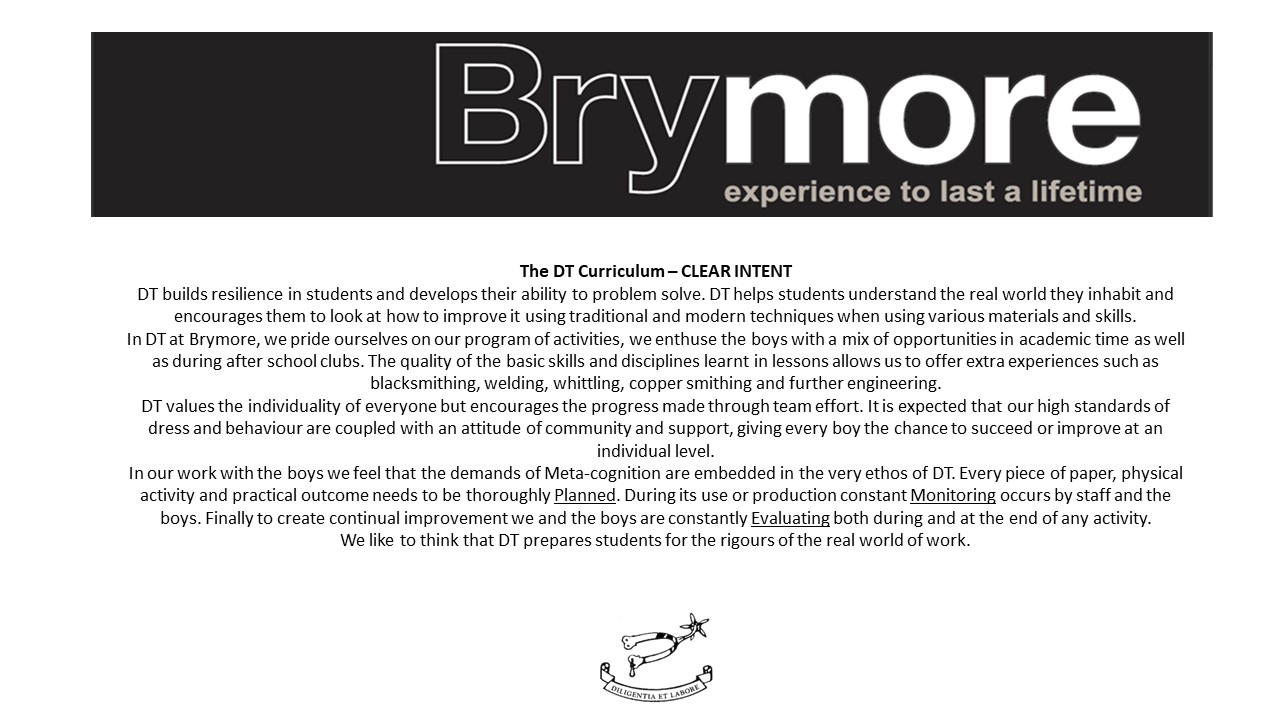Design and Technology: Developing creative design and quality manufacture.
Brymore students have achieved outstanding results in their Design and Technology GCSE, making us one of the highest achieving schools in Somerset for the subject area and stretching students to achieve to their full potential.
Design and Technology is a core part of the curriculum, which aims to equip students with qualities and experiences that will be applicable in a wide variety of contexts in their life after school. A wide range of practical skills are learnt in a variety of materials areas, focussing on wood in their final year. It gives students the opportunities to learn skills that they would not be able to develop to the same level at other schools. We emphasise the importance of independent thinking and learning as well as the designing and making skills that are taught in our well-equipped workshops.
Design & Technology at Brymore in Key Stage 3
The expectations within DT at Brymore are very high, our facilities mean we have an opportunity to offer boys a very real, hands-on experience of manufacturing skills that they could use for a career later on. Starting early we want the boys to develop their own sense of responsibility, teamwork and safety whenever they are in the workshops or looking to solve the problems they are challenged with.
In order to get the best from each individual the year 7 course is aimed at ‘Investigation’. Time is spent learning about and using the range of tools, machines and materials we have on offer. The building blocks for creative designing are established and we try to instil an independent approach that will allow each boy to do his very best.
We start with some baseline assessment tasks which look at the boys’ designing and workshop skills. Then over the course of the year boys will complete a softwood box, a metal candle sconce and an acrylic badge. Each of the projects will also have smaller, simpler tasks associated with them to build confidence and skill levels. The focus is very much on helping boys to improve their understanding by doing. Alongside the workshops, we work in the classroom to reinforce the practical learning by developing their understanding of the design process, hand and ICT drawing techniques, the theory behind tools and materials and finally looking at cultural design in our ever changing world.
By year 8 the emphasis changes to a more ‘cognitive’ approach, expecting the boys to show greater understanding and control of their environment. Projects include mechanisms, machine use in metalwork and designing products in a more sustainable way. The aim is to create confident boys who can hone their skills and contribute positively to the world around them.
As they move through year 9 towards their GCSE we push hard for boys to show their ‘autonomy’, we feel it is vital that as young designers and makers they need to be independent thinkers and young adults who can express themselves but also know why they think like they do. This creates resourceful and trustworthy students, confident in all aspects of the workshops and theory lessons. Projects now include full design and make tasks like the Lamp project.
It is an intensive programme that is demanding for the boys; with the correct approach, it should prepare them for the rigours of GCSE and beyond.
Design & Technology at Brymore for GCSE
By kS4 we expect our boys to be ready for the challenge, expectations are high. Brymore boys have a long standing reputation for producing top quality products. To make sure we can fully prepare them for further study or potential employment we offer two GCSE equivalent courses. The boys have to take DT GCSE but can add the option of Engineering as well.
EXAM BOARD: AQA. Design & Technology.
This course can be achieved at Grade 1-9.
How many exams do I take and when?
50% Final exam – taken in the Summer of yr11. 50% Major Project & A3 Design portfolio.
What will the DT course be like?
The exam will cover all materials and disciplines (wood, metal, plastic, electronics etc), also topics like design principles, sustainability, forces and mechanisms. It is important to note that the focus of this exam will be wood and that it will include work carried out in KS3.
The major project takes two terms and is started at the end of yr10, the portfolio must show off all that they have learnt and the final year GCSE design projects always make an impressive display of imaginative design, organised working and attention to detail.
Engineering
EXAM BOARD: NCFE – Level 1 / 2 Technical award in Engineering.
This course can be achieved at level 1 or 2 and with a Pass/Merit/Distinction. (It has a GCSE equivalence)
How many exams do I take and when?
40% Exam – taken in November of Year 11. There is a chance for a retake in March of Year 11.
60% Synoptic Task – submitted in March of Year 11. There is a chance to resubmit in May of Year 11.
What will the Engineering course be like?
This is the course for those boys who enjoy the more technical aspects of the workshops such as precision measurement, quality manufacture and industry standard production. Students need to use maths and science in the study of engineering principles, we will also look at the way drawings are used to communicate information and how accuracy must be kept within a tolerance of less than a millimetre. Boys will gain an understanding of how Industrial practices affect an engineer’s work and how knowledge of the tools and materials needs to be applied to differing situations. Time will be divided between classroom theory and rigorous development of high grade hand fitting skills in the workshops.
The exam focusses on the materials, tools, engineering disciplines and drawing systems needed to make a competent engineer. The synoptic project is announced in December and asks to boys to investigate a problem, design a solution and evaluating it. (in recent years this has been bridge building and mechanical arm design).
Head of Design and Technology – Mr Austin




